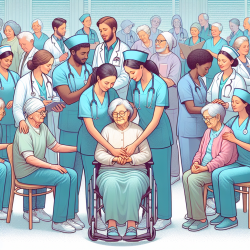Introduction
In the realm of healthcare, end-of-life (EOL) care is a critical component that demands a nuanced understanding of patient needs, both physical and spiritual. The research article titled "Attitudes of Registered Nurses about the End-of-Life Care in Multi-Profile Hospitals: A Cross-Sectional Survey" provides valuable insights into the attitudes of nurses towards EOL care, highlighting both barriers and facilitating behaviors that can influence care quality. This blog post aims to explore these findings and suggest ways practitioners can enhance their skills and improve patient outcomes.
Understanding the Research
The study surveyed 1,320 registered nurses across seven hospitals in Lithuania, focusing on their attitudes towards EOL care. It revealed that nurses prioritized safe and effective care, emphasizing the importance of addressing patients' spiritual needs. However, several barriers were identified, including:
- Angry family members and inadequate understanding of nursing care by relatives.
- Lack of time for meaningful conversations with patients.
- Insufficient nursing knowledge to support bereaved families.
- Physicians' reluctance to discuss diagnoses and overly optimistic views.
Facilitating behaviors that could improve EOL care included end-of-life training, volunteering, and family involvement.
Implications for Practitioners
For practitioners aiming to improve their EOL care skills, the study suggests several actionable steps:
- Training and Education: Continuous professional development in EOL care can equip nurses with the necessary skills to handle complex emotional and spiritual needs of patients and their families.
- Family Engagement: Educating families about the EOL process and involving them in care decisions can alleviate misunderstandings and reduce emotional tensions.
- Interdisciplinary Collaboration: Encouraging open communication between nurses and physicians can ensure a more cohesive approach to patient care, addressing the identified barrier of inadequate physician-nurse communication.
Encouraging Further Research
While this study provides a comprehensive overview of current attitudes and barriers, further research is needed to explore how these findings can be applied in different cultural and healthcare settings. Practitioners are encouraged to engage in research initiatives that focus on innovative strategies for overcoming identified barriers and enhancing EOL care quality.
Conclusion
The attitudes of nurses towards EOL care play a pivotal role in the quality of care provided to terminally ill patients. By addressing identified barriers and implementing facilitating behaviors, healthcare practitioners can significantly improve patient outcomes. Continuous education, family involvement, and interdisciplinary collaboration are key strategies for enhancing EOL care. To delve deeper into the original research findings, please follow this link: Attitudes of registered nurses about the end – of – life care in multi-profile hospitals: a cross sectional survey.










